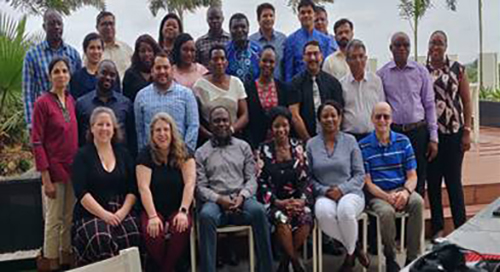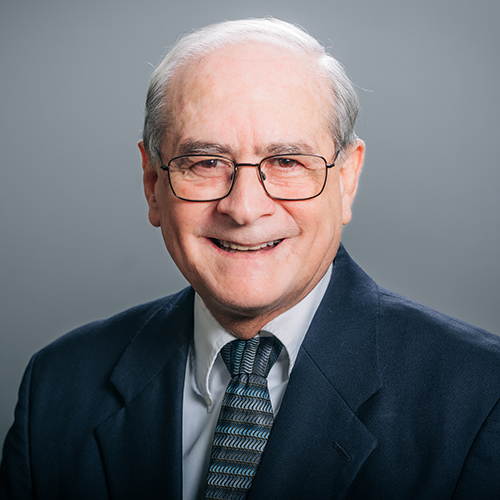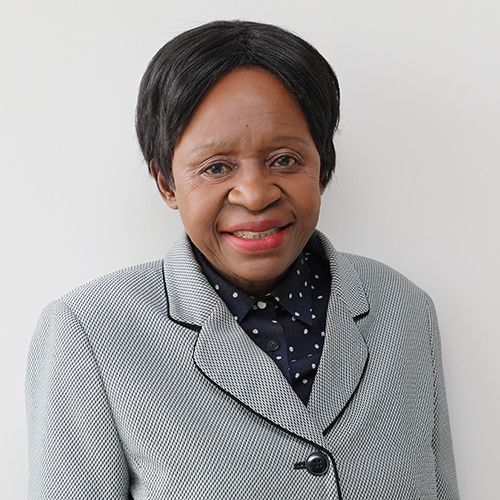 NICHD Global Network for Women’s and Children’s Health Research team, composed of members from across seven countries, in ZambiaThe funding for UAB’s site of the ongoing program, Global Network for Women’s and Children’s Health Research, has been competitively renewed for a seven-year term by the Eunice Kennedy Shriver National Institute of Child Health and Human Development (NICHD) of the National Institutes of Health.
NICHD Global Network for Women’s and Children’s Health Research team, composed of members from across seven countries, in ZambiaThe funding for UAB’s site of the ongoing program, Global Network for Women’s and Children’s Health Research, has been competitively renewed for a seven-year term by the Eunice Kennedy Shriver National Institute of Child Health and Human Development (NICHD) of the National Institutes of Health.
The Global Network for Women's and Children's Health Research conducts multi-center research in countries with limited resources. They do this by pairing researchers from other countries with those from the U.S. The main aim is to test affordable and lasting solutions to enhance the health of mothers and children. At the same time, they work on strengthening the ability to conduct research locally. This way, they make it possible for local researchers to keep going with their studies, which will eventually lead to better healthcare systems and individual health.
Through this program, UAB and the University Teaching Hospital/University of Zambia in Lusaka, Zambia have collaborated on a project titled “Interventions to Reduce Infant Mortality and Morbidity in Low Resource Settings,” which has been continuously funded since 2003. The project is led by Wally Carlo, M.D., distinguished professor in the Department of Pediatrics and Edwin M. Dixon Endowed Chair in Neonatology, and Elwyn Chomba, M.D., professor in the Department of Pediatrics and Inaugural Vice Chancellor of Levy Mwanawasa Medical University since 2019.
 Wally Carlo, M.D.“This funding will allow the UAB-Zambia Team to continue to have a leading role and participation in the NICHD Global Network for Women’s and Children’s Health Research to conduct transformational research to improve maternal and child care and reduce adverse pregnancy and child outcomes by contributing to changes in international guidelines,” said Carlo.
Wally Carlo, M.D.“This funding will allow the UAB-Zambia Team to continue to have a leading role and participation in the NICHD Global Network for Women’s and Children’s Health Research to conduct transformational research to improve maternal and child care and reduce adverse pregnancy and child outcomes by contributing to changes in international guidelines,” said Carlo.
The continued high rates of neonatal, infant, child, and maternal mortality and severe morbidities require proven effective interventions and well-planned implementation processes supported by local and international partners to improve healthcare in resource-limited settings.
Alan T. N. Tita, M.D., Ph.D., director for the Mary Heersink Institute for Global Health (MHIGH) and associate dean for Global and Women’s Health, is a co-investigator in this program. “Compared to many high-income countries, women, and newborns in many low- and middle-income countries (LMICs) are up to 100 times more likely to die during childbirth and the first few weeks after,” said Tita. “Congratulations to Dr. Carlo and Dr. Chomba and their colleagues on the competitive funding.”
The team, which includes Musaku Mwenechanya, MBChB, MMed, program director for the Zambia team at the University Teaching Hospital/University of Zambia in Lusaka, is committed to helping reduce the disproportionately high burden of maternal and infant morbidity and mortality in LMICs.

Neonatal care has been shown to be effective in reducing mortality and morbidity.
“Appropriate care now saves over 90% of the infants who used to die in the U.S. early in the 20th century,” said Carlo. “Africa has the highest neonatal mortality rates worldwide with preventable neonatal mortality and morbidities accounting for over 50% of the present deaths and morbidities.”
The program has impacted maternal and neonatal care practices globally. “The two seminal clinical trials led by the UAB-Zambia Team in Zambia and six other countries resulted in the Essential Care for Every Baby and the Helping Babies Breathe programs of the Helping Babies Survive Program of the American Academy of Pediatrics, a suite of evidence-based, hands-on training programs developed to reduce neonatal mortality in resource-limited environments,” said Carlo. “These programs are now used worldwide and are reducing neonatal mortality.”
In addition to these education initiatives, randomized trials of low-dose aspirin during pregnancy and intrapartum azithromycin have resulted in improved outcomes. These trials have been conducted over a period of time in the communities with community participation and training.
“Community data on pregnancy, maternal, fetal, and neonatal outcomes and trends in these data over time are often not available in low-resource countries, have been collected vital for policy direction,” said Chomba.
There are many opportunities for clinicians, researchers, and students at UAB and other institutions to become involved, including in ongoing research as well as opportunities to propose new research to be conducted in the Global Network. The Zambia Global Network site is looking forward to bringing in doctors to participate in research to strengthen the North-to-South capacity-building to improve health outcomes in women and children. If you are interested in becoming involved, please contact the Mary Heersink Institute for Global Health by emailing